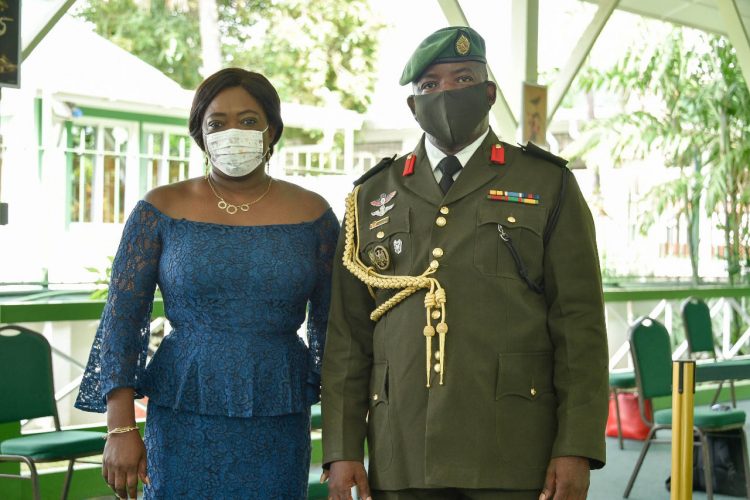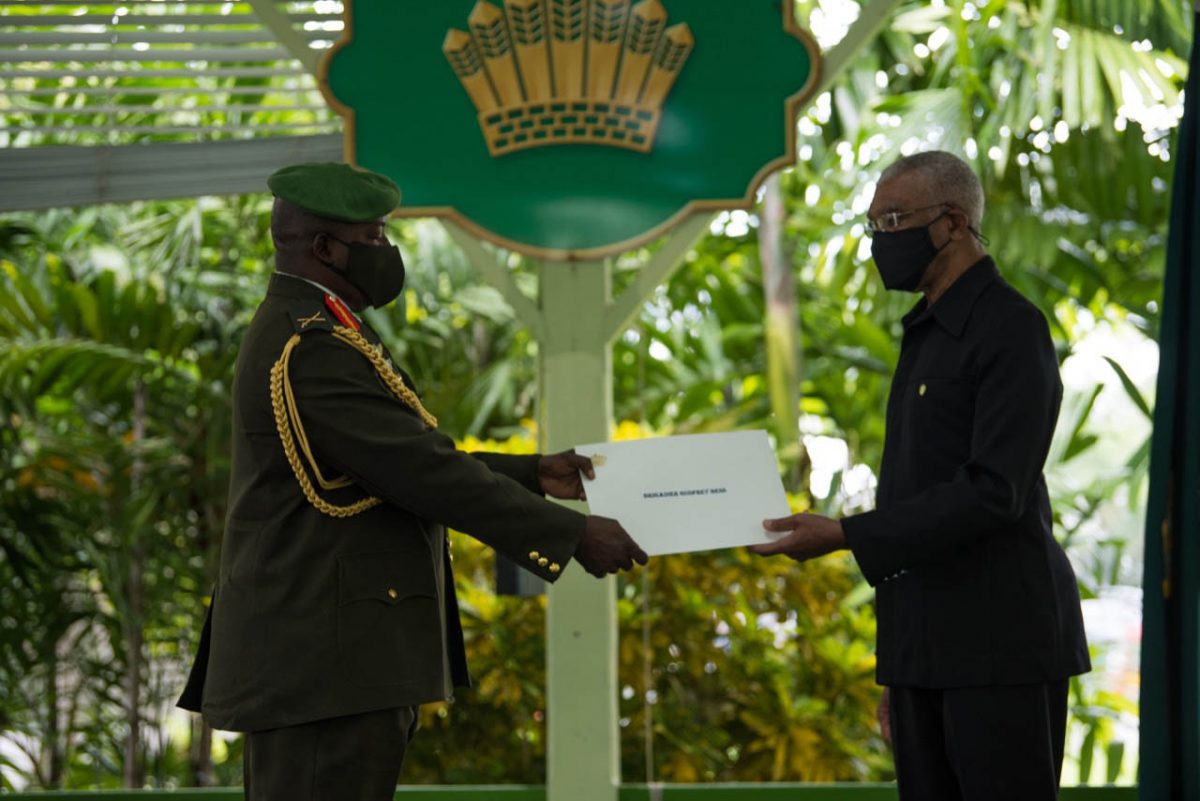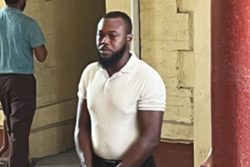The Guyana Defence Force (GDF) will support a democratically-elected government, newly-appointed acting Chief Staff, Brigadier Godfrey Bess yesterday said.
“We are trained to support the democratically-elected government of the day based on our constitution, and that we will continue to do. Our relationship with the civil authorities always is subordinate and we take instructions, legal instructions,” Best yesterday said when asked about how he feels about the role of the military in democracy in the hemisphere.
As it pertains specifically to Guyana, which has been waiting for over four months for elections results and has seen the incumbent APNU+AFC adamantly refusing to accept that the recount results show that it had lost the elections, Bess was asked if the army would support an undemocratically elected government.

“The Guyana Defence Force is a professional organisation and we will stick to the constitution of Guyana,” he said in reply.
The new Chief of Staff reminded that the defence force “is always subordinate to civil authorities and we do have a subordinate role and supportive role to civil authorities.”
Bess was yesterday simultaneously promoted to Brigadier and Chief of Staff by caretaker President and Commander-in-Chief David Granger at a ceremony held at State House. Witnessing the event were a number of disciplined services officers and Bess’ wife Shandelle and his children: daughter Belinda and son Godfrey Jr.
The Stabroek News had on June 17th reported that the winner of the Presi-dency was expected to pick the next Chief of Staff. This newspaper was told that there were then, including Bess, five senior colonels in the GDF who all have similar seniority and qualifications. The others are Colonels Trevor Bowman, Rawle Jerrick, Gary Beaton and Sherwin Anderson.
Bowman was approved to serve as Inspector General; Anderson as Quartermaster General; and Jerrick as Adjutant General, all with effect from yesterday.
While announcing the decision on Monday to have Bess serve, the Ministry of the Presidency said it was to facilitate Chief of Staff Brigadier Patrick West proceeding on pre-retirement leave, Observers have said that there seemed to be a rush by Granger himself to formalise the appointment and the reason for this has been questioned.
‘Build’
Granger yesterday reminded that the constitution gives him the right to appoint the Chief of Staff, as he urged Bess to continue with the developmental plans of his predecessor.
“The Chief of Staff is expected to build on the Force’s achievements over the past five years. It is anticipated that he will continue the progress initiated by the Guyana Defence Board and our Government in reorganising and re-equipping the Force, improving its responsiveness throughout all Ten Administrative Regions, and intensifying defence cooperation and defence diplomacy with friendly countries,” Granger said.
He posited that the Chief of Staff is not merely the holder of the highest rank and most prestigious appointment in the Force but that he is required to exercise command continuously in order to achieve the objectives of the Defence Board and directives of the Minister in order to accomplish the Force’s mission.
“He must communicate, coordinate and, most important collaborate with his subordinates. The Chief of Staff has to work with the general staff – Adjutant General, Inspector General and Quartermaster General – and with his specialist staff officers and the commanding officers of line units to collect, collate and interpret information in order to make the correct decisions,” he said.
“Command is the authority which the Chief of Staff exercises, lawfully, over subordinates by virtue of his high rank and unique appointment in the military service. Command includes the authority and responsibility for effectively employing the Force’s assets, and for coordinating and controlling military forces for the accomplishment of the Force’s mission. Leadership, unlike command, cannot be mandated by law. It is an essential element in military command, however, and involves motivating the Force’s manpower to achieve success in its operations and missions. The Chief of Staff, in this regard, is expected to possess the qualities of intelligence and prudence and to set the ‘Values and Standards’ expected of the Force and its members. The Chief of Staff will be expected to encourage his officers and soldiers to achieve the Force’s objectives to ensure the success of its exercises, operations and missions and to improve the Force’s effectiveness,” he added.
‘Lead’
He told Bess that the duties expected of him as a guardian of national defence were to provide leadership to the Force, to safeguard Guyana’s airspace, secure its sea space and exercise surveillance over its airspace and land space.
“He is tasked with leading the Force forward to preserve the country’s patrimony, protect its territorial integrity and to promote national defence and security. Leadership is a personal, moral and intellectual quality that is founded on clear and coherent concepts, rational objectives, viable measures and the availability of adequate resources which enable and encourage disparate elements of the Force – air, land, sea and services – to work together as a team,” he said.
“The Chief of Staff’s task is not only to command and lead but, also less glamorously, it is to manage. Management includes the traditional textbook functions–of planning, organizing, staffing, coordinating and controlling. It involves more than handling inanimate materials; it is a process which requires motivating human resources to achieve the Force’s mission. A military manager must determine the Force’s short-term tactical, and long-term strategic, objectives and determine the direction of its development, communicate with units, coordinate activities, control events, to collaborate with Government agencies and to work willingly to achieve its objectives. He must be clear-headed and courageous in making bold decisions and in accepting responsibility for the consequences of those decisions,” he added.
‘Challenging’
But the President said that Bess’ role this year can prove difficult as the country deals with becoming a petroleum state and the rolling out of a number of planned programmes.
And as he underscored that promotions should be about experience and merit, Granger said that Bess’ appointment was done under such a system.
“The Defence Force’s Career Development Rules allow for continuity of command. The Rules which govern the appointment and promotion of the most senior officers reduce the influence of bias and subjectivity and foster the development of a meritocracy. It rewards experience, intelligence, performance and prudence, thereby enhancing morale and ensuring greater efficiency,” Granger said.
“The Force must not return to the days of subjective appointments and promotions. An objective, non-partisan system of succession planning must be maintained in the interest of ensuring a professional leadership capable of fulfilling the Force’s mandate,” he added.
He told attendees that the Chief of Staff is guaranteed the support of the Defence Board and the Government and that Bess is expected to be guided “by the doctrine of total national defence which impels all the elements of national power – diplomatic, economic, military, political, social and technological – will be deployed in support of national defence.”
‘Public trust’
Most importantly, Granger said that the Chief of Staff must continue to restore public confidence in the Force. “He must be assured of the confidence and full support of the entire Force in maintaining public trust,” the President said.
Bess said that he saw his role as “a sacrosanct duty to defend the integrity of this country” and hopes to better the protection of this nation and fulfill his responsibilities.
But he said that there has been challenges and one such has been the lack of resources for the army but because of continuous training they are working, albeit limitations. “There will always be challenges and one of the main challenges… I do anticipate is adequate resources to perform tasks. We in the Guyana Defence Force are trained to get the job done and what do we do when resources are minimal? Our training that we receive helps us to create, I would say, opportunities to fight against those challenges. So training in the Guyana Defence Force, we take it seriously and it helps us in these times of challenges,” he said.
And with Guyana’s porous borders being a continuous challenge, he said that the army will work with government agencies to tackle the issue.
“The Guyana Defence Force with other agencies including Ministry of Citizenship, Guyana Police Force, Ministry of Public Securities, GRA and other agencies, presently are working to ensure that our porous borders are secured.
“Since 2018 we have mounted Operation Armadillo, which more or less deterred the criminal elements that were operating on the Venezuelan border. And recently, as a result of the pandemic [COVID-19], we have launched Operation Nexus which allows us to protect our borders,” he added.








